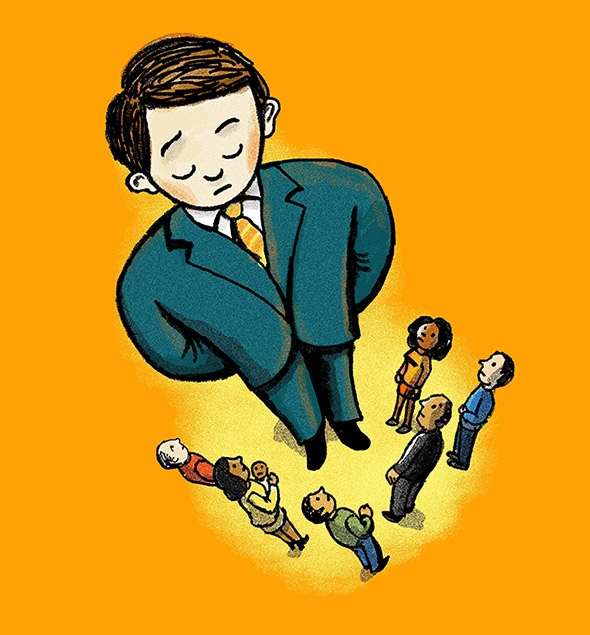Rich people think they really are different from you and me.

Illustration by Robert Neubecker
London’s mayor, Boris Johnson, drew
criticism late last year for saying that economic inequality can be
attributed, in part, to IQ. “I am afraid that [the] violent economic
centrifuge [of competition] is operating on human beings who are already
very far from equal in raw ability,” he told an audience at the Centre for Policy Studies.
That’s a satisfying worldview for someone who is successful and
considers himself unusually bright. But a quick look at the data shows
the limitations of raw smarts and stick-to-itiveness as an explanation
for inequality. The income distribution in the United States provides a
good example. In 2012 the top 0.01 percent of households earned an
average of $10.25 million, while the mean household income for the country overall was $51,000.
Are top earners 200 times as smart as the rest of the field? Doubtful.
Do they have the capacity to work 200 times more hours in the week? Even
more doubtful. Many forces out of their control, including sheer luck,
are at play.
But say you’re in that top 0.01 percent—or even the top 50 percent.
Would you want to admit happenstance as a benefactor? Wouldn’t you
rather believe that you earned your wealth, that you truly deserve it?
Wouldn’t you like to think that any resources you inherited are
rightfully yours, as the descendant of fundamentally exceptional people?
Of course you would. New research indicates that in order to justify
your lifestyle, you might even adjust your ideas about the power of
genes. The lower classes are not merely unfortunate, according to the
upper classes; they are genetically inferior.
In several experiments published in the Journal of Personality and Social Psychology,
Michael Kraus of the University of Illinois at Urbana–Champaign and
Dacher Keltner of the University of California at Berkeley explored what
they call social class essentialism. Essentialism is the
belief that surface differences between two groups of people or things
can be explained by differences in fundamental identities. One sees
categories as natural, discrete, and stable. Dogs have a certain dogness
to them and cats a certain catness.
Researchers have found that people hold essentialist beliefs about
generally biological categories such as gender, race, and sexuality, as
well as about more cultural ones such as nationality, religion, and
political orientation. Essentialism leads to stereotyping, prejudice,
and a disinclination to mingle with outsiders. Kraus and Keltner wanted
to know if we see social class as an essential category.
They started by developing a scale for measuring essentialistic
beliefs about class. A diverse group of American adults rated their
endorsement of such statements as “I think even if everyone wore the
same clothing, people would still be able to tell your social class,”
and “It is possible to determine one’s social class by examining their
genes.” On average, people rated the items a 3.43, where 1 means completely disagree and 7 means completely agree.
Participants also gave a subjective rating, from 1 to 10, of their
own social class rank within their community, based on education,
income, and occupational status. The researchers found that higher
social class was associated with greater social class essentialism. This
pattern remained even after controlling for political orientation as
well as objective measures of a participant’s income and education
level, indicating that it’s one’s sense of being above or below others, not one’s actual resources, that drives the result.
Kraus and Keltner looked deeper into the connection between social
class and social class essentialism by testing participants’ belief in a
just world, asking them to evaluate such statements as “I feel that
people get what they are entitled to have.” The psychologist Melvin
Lerner developed just world theory
in the 1960s, arguing that we’re motivated to believe that the world is
a fair place. The alternative—a universe where bad things happen to
good people—is too upsetting. So we engage defense mechanisms such as
blaming the victim—“She shouldn’t have dressed that way”—or trusting
that positive and negative events will be balanced out by karma, a form of magical thinking.


No hay comentarios.:
Publicar un comentario